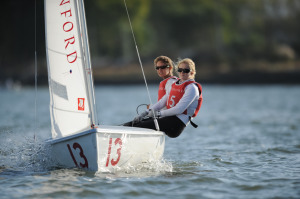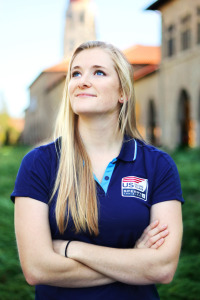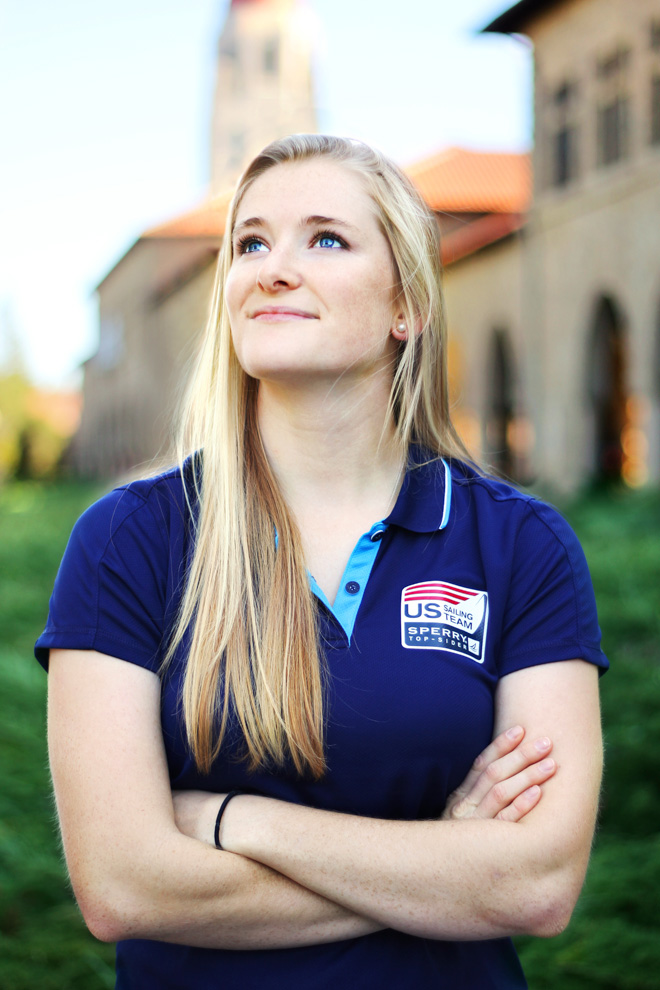Sailor Helena Scutt ’14 was born an aspiring Olympian. Ever since her earliest years, she has always dreamed of having the chance to represent her country in the world’s greatest sporting competition.
“When I was young, I really wanted to go to the Olympics for soccer. I had a book about the Games, and I must have read it all, cover to cover, twenty times.”
Plenty has changed since Scutt’s childhood. Many obstacles have temporarily derailed her, and she even underwent a change of primary sports in high school. But the British-born Washingtonian has risen above the challenges and continuously pursued her early fantasy.
Just under two years before the world’s top competitors head to Rio de Janeiro to compete in the 2016 Olympic Games, Scutt is finally well-situated to achieve it. She and teammate Paris Henken have fought their way through many challenges to become America’s top-rated team in their class. Now, the remarkable duo is out to prove that they are the best in the world.
A champion from the start
Scutt has not always been an incredible sailor, but she has always been a top-notch athlete. As she grew up just outside of Seattle, she spent her time becoming a competitive soccer player before taking her talents offshore and beginning to compete on the water.
“I was obsessed with soccer,” said Scutt. “I was on the travel team and all that, but I eventually burnt out. My dad put me in sailing camps and I actually remember dreading them. He would ask ‘what do you think about sailing next summer,’ and I always thought ‘oh no.’ But once I truly started it, I loved it.”
It did not take long for Scutt to become proficient at this new sport. After learning the ropes in classes taught by a local nonprofit, she began to sail 29ers — an extremely fast, high-performance boat — at Seattle Yacht Club. She focused on becoming a crew, a position which required her to master flying two of the boat’s three sails and to operate a trapeze that suspends its user over the water to counteract the rotational force put on the boat by the wind. Scutt was a natural. By her senior year of high school, she had been named to the U.S. Olympic Development Team, and Stanford recruited her as part of what is considered by some to be the top collegiate sailing recruiting class of all time.

College sailing presented a new set of challenges for Scutt.
“I had a lot to learn,” she admitted. “Even though I was coming in with quite a bit of experience, college sailing boats are very different from the 29er. Fortunately, the crew in the 29er is a very active and important role, and all the skills translated very well.”
It certainly did not take long for Scutt to rise to the top in this new level of competition. At the end of her freshman year, she was voted captain by her teammates, a position that she would hold for two years before voluntarily stepping aside to open the opportunity to others. She elevated her abilities along with her highly touted classmates, and before long she was frequently competing in national championship regattas.
“My favorite experience was when we had nationals in Florida during my junior year,” Scutt recalled. “I sailed with [my classmate] Oliver Toole, and we won close to half the races we raced. It was really cool to see our hard work pay off.”
Scutt experienced an unfortunate setback at the beginning of her senior year when she was hit by another boat at high speed while racing at a world championship regatta. She suffered a spinal fracture, broken ribs and internal bleeding in her kidneys. Instead of using the horrific accident as an excuse to slow down, however, Scutt redoubled her efforts. She made a miraculous recovery, and returned in plenty of time to help Stanford to third and fourth place finishes in the two co-ed national championship regattas earlier this year.
“The [injury] only increased my desire to continue sailing,” said Scutt. “Everything can change in an instant, so you better be doing what you love and living what you love.”
Living what she loves
Even as she excelled in the slower, less technical boats utilized in the collegiate ranks, Scutt did not forget her love for high-performance racing. When 49er FX was named as a woman’s Olympic class for Rio de Janeiro — the first time that a high performance woman’s boat has featured in the Games — Scutt jumped at the opportunity.
“The Olympics weren’t so much on my mind during my freshman and sophomore years. When the 49er FX was chosen, I realized I am one of the best crews in the United States for this type of boat and decided to go for it.”
Scutt became particularly competitive when the U.S. Olympic coaches paired her with Paris Henken, a long-time acquaintance of hers who was still in high school at the time. Henken also had a good deal of experience racing high-performance skiffs, and it became immediately apparent that the pair had extremely good chemistry on the water.

“Our sailing styles really compliment each other,” said Scutt. “[Paris] sails a lot by feel, and I have a little bit more of a calculated approach. Those are our tendencies; when it comes together, it is really powerful.”
The team did not take long to start topping their domestic competition. Even as Scutt began to pursue a fifth-year master’s degree at Stanford and Henken became a freshman at the College of Charleston, they managed to hold off their foes and become the top-rated team in the United States.
Their biggest competition for this title thus far has come from a team led by, of all people, the Stanford sailing head coach’s wife. The teams have gotten along well, and have tried to use each other to get better in training sessions.
“She’s awesome. It has been really great to be training with her,” said Scutt.
Unlike many Olympic sports, however, being the top team in a particular country does not necessarily guarantee a chance to compete in the games. Only twenty different countries are given an opportunity to field a boat in the pair’s class, and teams must qualify with a top-level finish at either the 2015 or 2016 49er FX World Championships to secure their spot. This may be Scutt and Henken’s biggest obstacle, and one that will ultimately determine their success or failure in this quest.
Going for Gold
Scutt and Henken will put their academic careers on hold after this quarter in order to get as much practice time as possible. In order to better understand the conditions in the venues at which they will have to compete, they will travel to many different parts of the world to observe the wind and tidal patterns and improve their speed.
“I finish a final at 10 p.m., and I’ll be on an airplane [to Rio] by 7 a.m. the next day,” Scutt said.
After that, they will spend a month in Miami, followed by a tour to many parts of Europe and South America in order to compete in as many top-level events for their boat as possible. Raising funds to execute this vital campaign is another one of the greatest obstacles faced by the team, and they are counting on many generous donations to make it possible.
Scutt believes that the dream of competing in this historic event will keep her and Henken motivated. Now that her childhood goal is in reach, she is cautiously excited for what the future holds.
“[Getting the chance to compete in the Olympics would] be the biggest event of our lives so far,” said Scutt. “We want to make everyone [we] know proud. And, of course, above all, we want to make ourselves proud.”
If you’d like to support the Henken-Scutt Olympic campaign or follow their progress, please visit henkenscuttsailing.com.
Contact Andrew Mather at amather ‘at’ stanford.edu.
